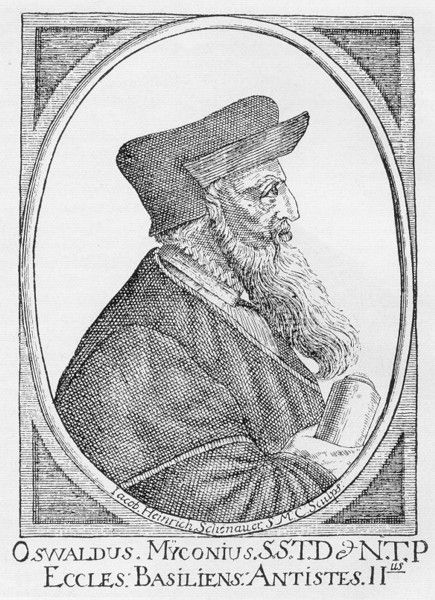Oswald Miconius on:
[Wikipedia]
[Google]
[Amazon]
 Oswald Myconius (1488,
Oswald Myconius (1488,
 Oswald Myconius (1488,
Oswald Myconius (1488, Lucerne
Lucerne ( , ; High Alemannic German, High Alemannic: ''Lozärn'') or Luzern ()Other languages: gsw, Lozärn, label=Lucerne German; it, Lucerna ; rm, Lucerna . is a city in central Switzerland, in the Languages of Switzerland, German-speaking po ...
– 14 October 1552, Basel) was Swiss Protestant theologian and Protestant reformer. He was a follower of Huldrych Zwingli.
Life
He was born at Lucerne,Switzerland
). Swiss law does not designate a ''capital'' as such, but the federal parliament and government are installed in Bern, while other federal institutions, such as the federal courts, are in other cities (Bellinzona, Lausanne, Luzern, Neuchâtel ...
. His family name was Geisshüsler, and his father was a miller; hence he was also called Molitoris (Latin ''molitor'', "miller"). The name Myconius is said to have been given him by Erasmus; it alludes to the proverbial expression ''bald-headed Myconian''."Erasmus, with his penchant for a classical pun, had nicknamed the teacher Myconius, referring to the Ancient Greek geographer Strabo
Strabo''Strabo'' (meaning "squinty", as in strabismus) was a term employed by the Romans for anyone whose eyes were distorted or deformed. The father of Pompey was called "Pompeius Strabo". A native of Sicily so clear-sighted that he could see ...
’s observation that the men of Mykonos were bald." Moyle, Franny, ''The King's Painter: The Life and Times of Hans Holbein'', New York: Abrams Press, 2021, p. 58. From the school at Lucerne he went to the University of Basel to study classics. From 1514 he obtained teaching posts at Basel, where he married, and made the acquaintance of Erasmus and of Hans Holbein, the painter. In 1516 he was called, as schoolmaster, to Zürich, where (1518) he attached himself to the reforming party of Zwingli. This led to his being transferred to Lucerne and again, in 1523, reinstated at Zürich.
On the death of Zwingli (1531) he moved to Basel, where he held the office of town's preacher, and (till 1541) the chair of New Testament exegesis. In 1534 he authored the Confession of Basel The Confession of Basel is one of the many statements of faith produced by the Reformation. It was put out in 1534 and must be distinguished from the First and Second Helvetic Confessions, its author being Oswald Myconius, who based it on a shorter ...
. In confessional matters he was for a union of all Protestants
Protestantism is a branch of Christianity that follows the theological tenets of the Protestant Reformation, a movement that began seeking to reform the Catholic Church from within in the 16th century against what its followers perceived to b ...
. Although a Zwinglian, his readiness to compromise with the advocates of consubstantiation gave him trouble with the hard-line Zwinglians. He had, however, a distinguished follower in Theodore Bibliander
Theodore (or Theodorus) Bibliander (german: Theodor Buchmann; 1509 in Bischofszell – 26 September 1564 in Zurich) was a Swiss orientalist, publisher, Protestant reformer and linguist. Born Theodor Buchmann (''Bibliander'' is a Greek translati ...
.
Works
Among his several tractates, the most important is ''De H Zwinglii vita et obitu'' (1536), translated into English by Henry Bennet (1561).References
*Further reading
* Melchior Adam, ''Vita theologorum'' (1620) *M. Kirchhofer, ''O. Myconius'' (1813) * Karl Rudolf Hagenbach, ''J. Oekolampad und O. Myconius'' (1859) *F. M. Ledderhose, in ''Allgemeine deutsche Biog'' (1886) *B. Riggenbach and Egli, in Hauck's ''Realencyklopadie'' (1903) {{DEFAULTSORT:Myconius, Oswald 1488 births 1552 deaths 16th-century Swiss people Swiss Calvinist and Reformed theologians 16th-century Calvinist and Reformed theologians